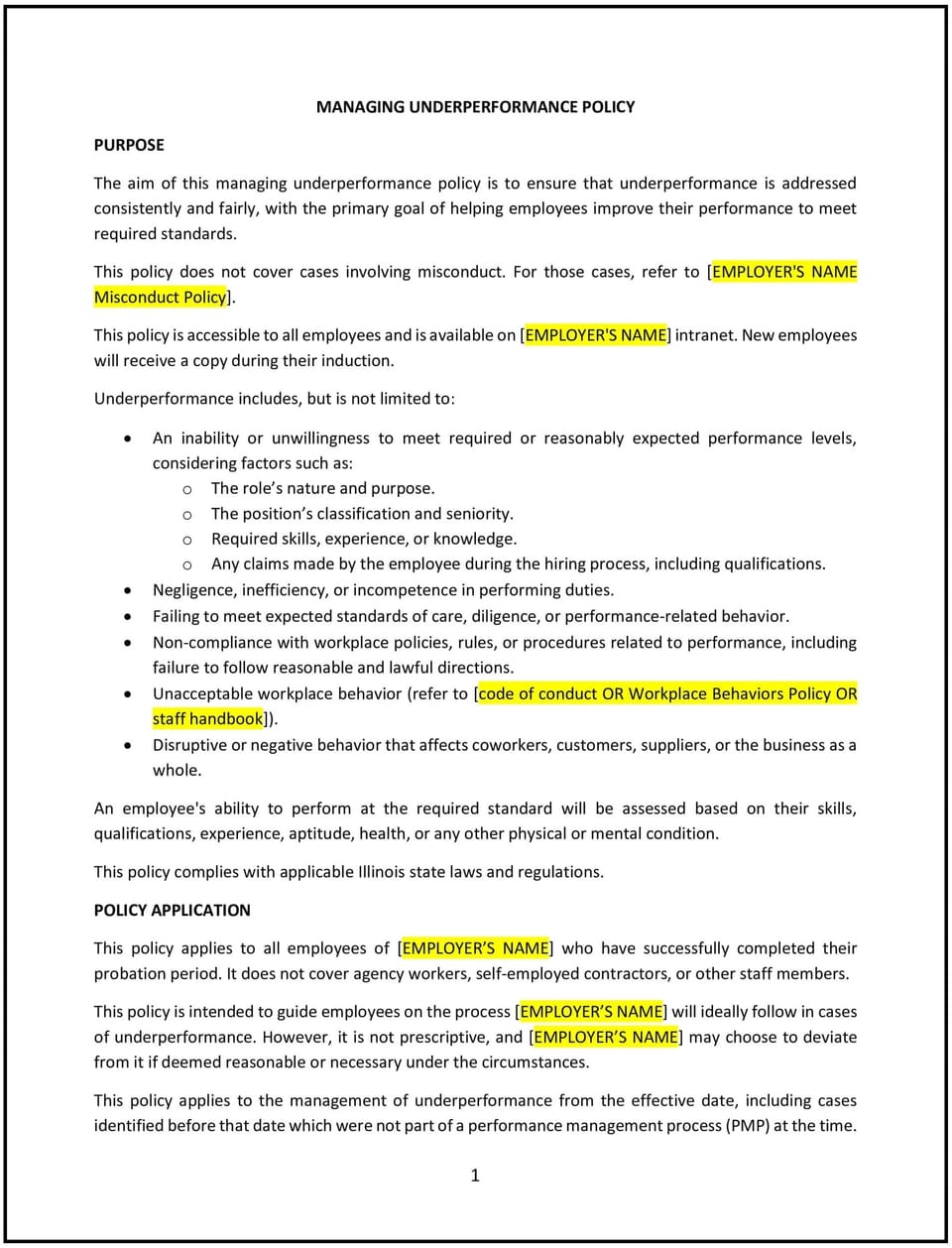Managing underperformance policy (Illinois): Free template

Managing underperformance policy (Illinois)
This managing underperformance policy is designed to help Illinois businesses address and improve employee performance issues constructively and fairly. It outlines procedures for identifying underperformance, providing support, and implementing corrective actions while promoting compliance with Illinois employment laws.
By adopting this policy, businesses can foster accountability, enhance productivity, and maintain a positive workplace environment.
How to use this managing underperformance policy (Illinois)
- Define underperformance: Clearly specify what constitutes underperformance, such as failure to meet job expectations, deadlines, or behavioral standards.
- Establish identification procedures: Outline how managers should identify and document performance concerns through regular evaluations or feedback.
- Provide support measures: Include steps for addressing underperformance, such as additional training, coaching, or setting clear performance improvement goals.
- Outline the performance improvement plan (PIP): Describe how PIPs will be used to set measurable objectives, timelines, and follow-up assessments.
- Emphasize communication: Encourage open and respectful discussions between managers and employees to address concerns collaboratively.
- Include disciplinary actions: Detail potential consequences for failing to improve, such as written warnings, reassignment, or termination, in compliance with Illinois laws.
- Promote fairness: Ensure that all employees are treated equitably during the performance management process.
- Monitor compliance: Regularly review performance management practices to align with Illinois laws and company policies.
Benefits of using this managing underperformance policy (Illinois)
This policy provides several benefits for Illinois businesses:
- Encourages accountability: Promotes clear expectations and constructive feedback to address performance concerns.
- Supports improvement: Provides employees with opportunities and resources to enhance their performance.
- Reduces legal risks: Aligns with Illinois employment laws, ensuring fair and compliant performance management practices.
- Enhances productivity: Helps employees align their performance with organizational goals.
- Builds trust: Demonstrates the company’s commitment to employee development and fair treatment.
Tips for using this managing underperformance policy (Illinois)
- Communicate the policy: Share the policy with employees and managers during onboarding and training sessions.
- Train managers: Provide training on identifying underperformance, delivering feedback, and implementing PIPs effectively.
- Document thoroughly: Maintain detailed records of performance evaluations, PIPs, and any disciplinary actions.
- Encourage collaboration: Foster a supportive environment where employees feel comfortable discussing challenges and seeking help.
- Update regularly: Revise the policy to reflect changes in Illinois employment laws or workplace practices.
Q: What is considered underperformance under this policy?
A: Underperformance includes failing to meet job expectations, missing deadlines, or demonstrating behaviors that negatively affect the workplace.
Q: How are underperformance issues identified?
A: Issues are identified through regular performance evaluations, feedback from managers, or documented incidents.
Q: What is a performance improvement plan (PIP)?
A: A PIP is a structured plan that outlines specific performance goals, timelines, and support measures to help employees improve.
Q: How are employees supported during the improvement process?
A: Support measures may include additional training, one-on-one coaching, or regular progress check-ins with managers.
Q: What happens if an employee fails to improve?
A: Employees who do not meet performance expectations after following the PIP may face disciplinary actions, such as reassignment or termination, as outlined in this policy.
Q: Are employees protected from unfair treatment during this process?
A: Yes, the policy ensures all employees are treated fairly and equitably, in compliance with Illinois employment laws.
Q: How often is this policy reviewed?
A: This policy is reviewed annually or whenever significant changes occur in Illinois employment laws or workplace practices.
Q: Can employees appeal decisions made under this policy?
A: Yes, employees may appeal performance-related decisions through the company’s grievance process, as outlined in this policy.
This article contains general legal information and does not contain legal advice. Cobrief is not a law firm or a substitute for an attorney or law firm. The law is complex and changes often. For legal advice, please ask a lawyer.


